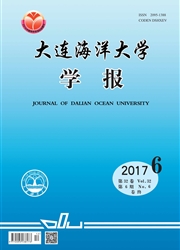

 中文摘要:
中文摘要:
以同期普通三疣梭子蟹Portunus trituberculatus(以下简称普通蟹RS)为对照,研究了低温(8℃)和高温(34℃)胁迫12 h内经溶藻弧菌感染后筛选的抗病候选群G2代三疣梭子蟹(以下简称筛选蟹G2S)的血蓝蛋白含量,以及血清中超氧化物歧化酶(SOD)、过氧化物酶(POD)、过氧化氢酶(CAT)、碱性磷酸酶(AKP)和酸性磷酸酶(ACP)活力的变化。结果表明:温度骤变后,筛选蟹G2S和普通蟹RS的血蓝蛋白含量在3 h时均达到峰值(P〈0.05),随后又逐渐下降,到3~12 h时已基本恢复到0 h的水平(P〉0.05)。两组蟹的SOD和AKP在低温、高温胁迫3 h内也均显著下降(P〈0.05),到3~12 h达到稳定的低水平(P〉0.05);在温度骤变的胁迫下,POD、CAT和ACP活力随时间变化也基本呈峰值变化,但达到峰值和趋于稳定的时间不具同步性。方差分析结果显示,筛选蟹G2S的免疫指标值均显著高于普通蟹RS(P〈0.05),说明筛选蟹G2比普通蟹RS在非特异性免疫因子方面更具免疫优势。以上结果表明:温度骤变的短期胁迫会影响机体的生理功能和机体的免疫防御能力,导致自由基代谢紊乱,从而诱导病害发生。
 英文摘要:
英文摘要:
The effects of temperature(8 ℃ and 34 ℃) stress for 12 hours on serum immunity parameters including the content of hemocyanin,and activities of superoxide dismutase(SOD),peroxidase(POD) and catalase(CAT),hydrolase(acid phosphatase ACP,and alkaline phosphatase AKP) were studied in swimming crab Portunus trituberculatus between the second generation of candidate disease-resistance stock(G2S) screened by the common stock(RS).Statistically,the significant effect of temperature stress was observed between two groups of G2S and RS during 12 hours.The content of hemocyanin was found to be increased in the groups of G2S and RS,a peak value at 3 h(P〈0.05),and then to be decreased significantly after 5h and constant during 7-12 h.In addition,there were significant decrease in SOD and AKP activities in the two groups during 3 h(P〈0.05),then stable after 3h.POD,CAT and ACP activities were also increased to a peak value at different times.There were higher content of hemocyanin and serum enzyme activities in G2S than those in the RS at both 0 h and stress time(P〈0.05).These results revealed that the rapid increment in temperature could result in metabolic maladjustment of free radicals and have profound effects on physiological and immune functions,and that G2S had the higher immune ability compared with RS.
 同期刊论文项目
同期刊论文项目
 同项目期刊论文
同项目期刊论文
 期刊信息
期刊信息
